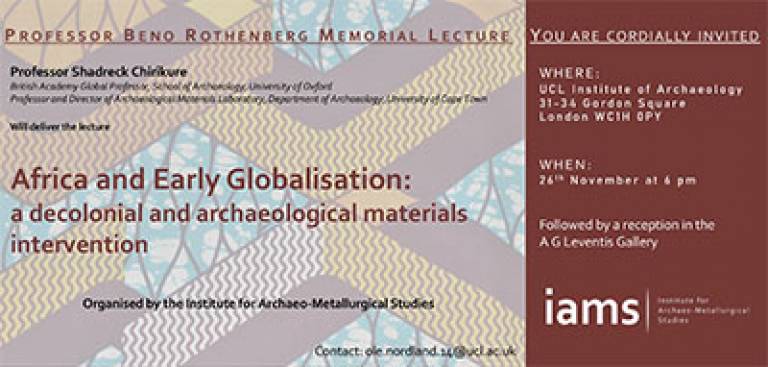IAMS Beno Rothenberg Memorial Lecture 2019: Africa and Early Globalisation
26 November 2019, 6:00 pm–7:00 pm

Shadreck Chirikure (University of Cape Town/University of Oxford) will give the IAMS Beno Rothenberg Memorial Lecture 2019 at the UCL Institute of Archaeology on 26 November.
This event is free.
Event Information
Open to
- All
Availability
- Yes
Cost
- Free
Organiser
-
Ole Nordland
Location
-
Archaeology Lecture Theatre G6Institute of Archaeology31-34 Gordon SquareLondonWC1H 0PYUnited Kingdom
Africa and early globalisation: a decolonial and archaeomaterials intervention
Abstract
Some traditional views erroneously assumed that Africa was backward and isolated from the rest of the world. Such scholarship emphasised the position that, in encounters with the external, Africa mostly supplied raw materials and labour in the form of slaves and rarely anything else. Consequently, rarely have researchers investigated the contribution of Africa to the development of Middle Eastern, Chinese and Indian civilisations. Decades of field based, laboratory-inspired and theoretically grounded studies of remnants of precolonial metallurgy continually show that across the continent from the West, through the Central, to the East and South, Africans were extremely adaptive and versatile in the production of iron, copper, gold, and among others, tin. The differential availability of resources precipitated trade and exchange and commodities circulations within Africa, and between Africa and the other parts of the world. In the process, Africa achieved the status of the heartbeat of circulation of various materials and ideas in the world including Europe and Asia. What, however, was the nature of this early global connectivity? As a follow on, what did Africa adopt from elsewhere, and what innovations did it give in return? Using case studies of pre-industrial metallurgy drawn from Africa’s multiple regions and theoretical flavours from decolonial thinking, the lecture engages with these and other questions. It argues that a significant mindset shift is required to understand, from within, the contributions of African innovations and materials to globalisation, looking outside. A failure to achieve this closes off a potentially interesting exploration of Africa’s material and intellectual contribution primarily to the evolution of globalisation and secondarily to globally shared histories.
Professor Beno Rothenberg (1914-2012), acclaimed photographer of the emerging state of Israel, self-taught scholar and founding father of archaeo-metallurgy, was one of only a handful of scientists who between them revolutionised the way in which we study and understand the production of metal prior to the Industrial Revolution. He pioneered the fusion of traditional archaeological and science-based approaches which later came to be known as archaeometry, with a strong emphasis on painstaking data gathering and photographic documentation in the field, chemical and mineralogical analysis of the archaeological remains unearthed, and visionary, if sometimes contentious interpretation of his observations. While his interests went well beyond the beginnings of mining and metallurgy, these are where he left his strongest legacy, not least through coining the very term 'archaeo-metallurgy', now used world-wide for the study of ancient metals and their production using scientific methods, and through establishing, directly and indirectly, two of the leading academic schools in this field. He was the founder of the Institute for Archaeo-Metallurgical Studies in 1973.
About the Speaker
Prof Shadreck Chirikure
at University of Cape Town/University of Oxford
Professor Shadreck Chirikure, a leading African archaeologist and archaeometallurgist, who currently holds posts in Cape Town and Oxford, and who has been renowned worldwide for his work across the African continent, including prominent sites like Great Zimbabwe. He is one of the rare scholars who have been equally successful in leading both fieldwork and laboratory-based research projects, which is probably best reflected by multiple awards he has received recently for papers in distinguished journals such as Antiquity.
More about Prof Shadreck Chirikure Close
Close

